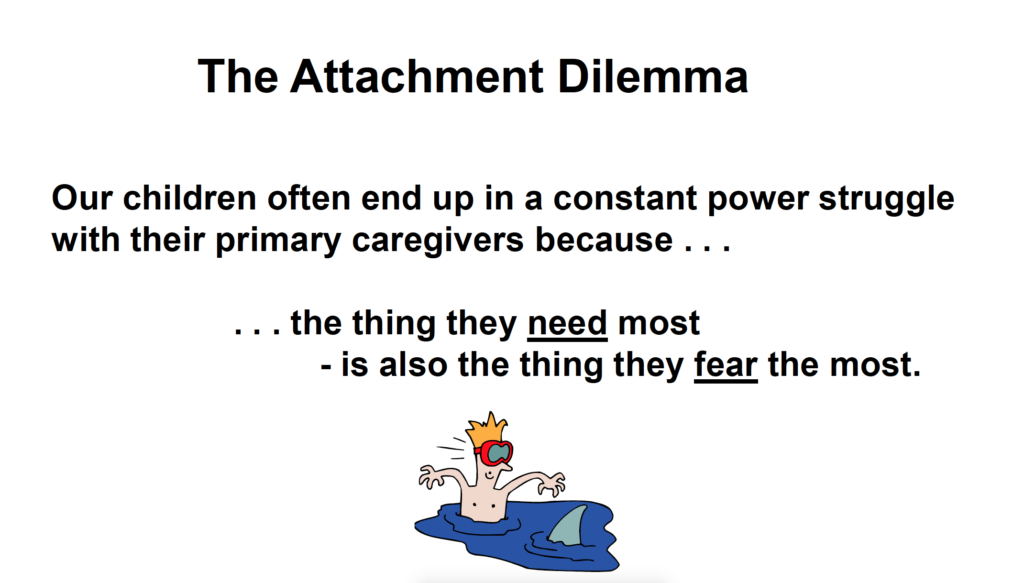This can be scary! But remember that attachment issues reside in all of us: just on a spectrum. Reactive Attachment Disorder or RAD is one end of the spectrum. Try not to get bogged down with hopelessness by this frightening diagnosis. Put your compassion hat on and learn more about how to live with and help your child to heal with RAD.

Defining Reactive Attachment Disorder
RAD didn’t become an official diagnosis until 1979; before then, it was called an attachment disorder. Children with the RAD diagnoses have difficulty interacting with others because of negative experiences from their early childhoods: typically due to separation from their early caregiver, and from abuse and/or neglect. Often children with RAD have difficulty calming down when stressed and do not turn to their caregivers when looking for comfort. These children may seem to have little or no emotions when interacting with others. They may appear unhappy, irritable, sad, or scared while having normal activities with their adopted families. Bottom line is their brains have been changed by the trauma of their past. True.
Now What?
You as the parent are the key to healing. An awesome and overwhelming task. If your child can really feel genuine safety with you, their healing can begin. Once you really understand what is underneath your child’s behaviors, you find compassion, stop taking it personally, and can be the parent your child needs. It is HARD!! Sometimes you will need to treat your child several years younger than they actually are. Sometimes, you will have to use your sense of humor like never before. Sometimes you will have to bite your tongue till it bleeds. Sometimes you will have to learn how to regulate yourself before you can teach that to your child. Sometimes you may even have to recreate the attachment cycle from infancy, even for a teen. It may feel ridiculous. But your child needs this. Their brain can be rewired with bonding and trust building experiences.
But My Child Hates Me!
No, they do not. It sure does feel like it at times. Try to join them. Do the activity they want to do. Play the game they choose. Ask them about their interests. Ask a lot of questions. Be enthusiastic. Be genuine. Get down on the floor with them . Ask them to teach and show you all about Roblox, World Wide Wrestling, Charli XCX, etc.

Use Time-In NOT Time-Out
Any discipline you use must be attachment focused. You still give consequences and correct behaviors, just right there with you, not from upstairs alone in their rooms. To read more about this “Time-In’ procedure, click here or watch this video. Basically your child has attachment issues and needs to be with you, not away from you when things get distressing from their bad choices. This is a tough pill to swallow as it is against all traditional discipline techniques. But it works.
Validate and Identify
When your kid is angry and directing that rage at you, it is almost impossible to do what I’m about to ask. Sit with them in their feelings. Validate them. And even identify what you think is really under that anger. There’s always something. This skill takes practice but is a wonderful tool to use with all kids. It can sound something like this: “Wow, you are pretty mad about losing Monopoly. I’m wondering if you are feeling left out from the rest of the family.”
Power Struggles
Bottom line is you will never win. Your adopted child with RAD will always beat you. They are experts. So dig deep into your parenting pockets to not to go down the rabbit hole of the classic parent-child power struggle. Easier said than done. Read more about how to accomplish this here and maybe here. Compassion is key. Support from other parents of RAD kids helps. Self care makes a huge difference too.

Transitional Objects
For all you parents out there that have a shadow following you wherever you go, this one’s for you. Give your child a transitional object they can put in their pocket when they are separated from you, even if is just by 4 walls. The idea is the object represents you, your forever love for them, and that you will always be their parent. These truths are nearly impossible for some children to hold onto if you are not in their direct line of vision. Some ideas are a painted rock, an angel pin, a necklace, a tee-shirt, and even a scent you wear.
You are Doing a Great Job
It may feel like you are miserably failing at parenting your child with RAD. Hey, most parents feel that about their neurotypical children. But you are killing it actually. Your challenges with your child are hard for others to even grasp. Yet you show up day in and day out and keep on trying. You consistently love your child, try very hard to heal their wounds, and keep coming back for more despite the sometimes awful feedback and responses they give you. They may feel unlovable and you may feel unloved. That there is the quandary. But you keep on loving them anyway. I see you.





